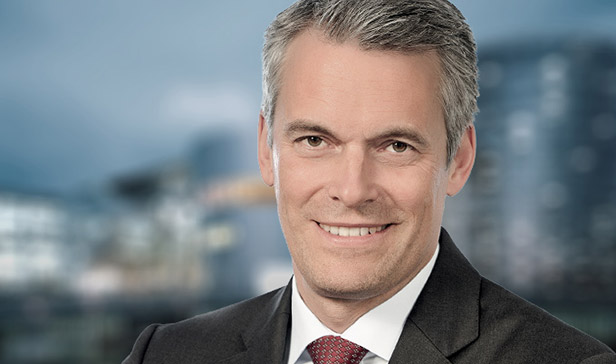By 2050, CO2 emissions in Germany are to be reduced by up to 95 percent compared with the reference year 1990. To achieve this, Germany's building stock is to be converted to climate-neutral status over the next 25 years. This is a Herculean task that the real estate industry must face up to. In the future, it will no longer be possible to duck out of the way as has been the case up to now. "If we are honest, many companies have only tackled the topic half-heartedly - even though we have been discussing it for years," Dr. Jochen Keysberg FRICS, CEO of Apleona, found clear words. As part of immobilienmanager's imForum discussion round at Expo Real, he discussed measures and challenges of climate protection in existing buildings with Daniela Albrecht (Leoni), Professor Dr. Kerstin Hennig (REMI) and Jochen Schenk (Real IS). A particular thorn in his side are the widespread pilot projects. "First of all, a pilot is run for half a year and then evaluated again for that long. That has to be over." In his opinion, there are enough proven and less capital-intensive measures that can be implemented immediately. These alone could achieve 20 to 30 percent of the necessary CO2 savings. "There is no reason to experiment anymore," Keysberg said. Pilots are also always a bit of an excuse to do nothing for now, he said.
For Daniela Albrecht, too, working off the 'low hanging fruits' has top priority. She heads Corporate Real Estate Management at Leoni AG, a cable specialist that operates as an automotive supplier, among other things. "But we mustn't kid ourselves: At some point, we'll have to invest on a larger scale - and in a competitive business like ours, where every penny counts, that's going to be a bloodbath," she cast her gaze further ahead.
This 'someday' occurs when the pure operational optimisations, which are possible without a large capital investment, have been exhausted. However, there is still a lot of untapped potential in the building stock. In turn, real estate companies could use the time bought by this to develop comprehensive ESG strategies and prepare the capital-intensive measures.
But even the supposed quick successes are not so easy to achieve in the existing stock. For example, if it has not even been digitally recorded which heating systems or which insulation is present. Generating and digitising this information for existing buildings that have changed owners several times in their history is already an immense challenge.
And for Professor Kerstin Hennig, the challenges will not diminish in the long term. "It's no use just appointing a sustainability officer or installing an ESG department. The topic must be laid out as a comprehensive strategy like a net over the entire company and that requires a change in thinking." Jochen Schenk, board member of asset manager Real IS, agreed with her. "This is a mindshift that runs parallel to other change processes such as digitalisation and societal change. Strategy implementation must take place at all levels in the company and every employee must be taken along." Real IS will classify its own portfolio into building types, because a completely individual view at the level of individual properties is not possible. After identifying the buildings with the most urgent need for action, a climate protection roadmap with concrete measures will be developed that defines the sequence and timing of the necessary measures.
In addition to these strategic construction sites at the companies, there is still a very tangible lack of a uniform definition for the analysis and measurement of sustainability criteria in the industry. "Benchmarking is lacking," says Professor Dr. Kerstin Hennig. "There are quite a few approaches, but not the one classification system that every company can take as a basis." Here, many industry players have high hopes for the Ecore initiative and that it will produce a standardisation for ESG data and its use in the coming months. This is urgently needed for the long-term strategic and capital-intensive measures," warned Dr. Jochen Keysberg.
Professor Dr. Kerstin Hennig made clear that data transparency and comparability is also indispensable in other areas. She brought the banks into play, who, when financing existing buildings or portfolios, have to assess how expensive any ESG-compliant upgrades of the properties in question will be. Decisions on financing conditions must then be made on this basis. Without a clear valuation basis, this is currently a difficult undertaking.
The four experts agreed that they have hardly experienced a topic that has gained relevance for the industry as rapidly as ESG and climate protection in the building sector. In addition to regulation and competition among each other, customer expectations are also a major driver. An experience that the industrial group Leoni is making more and more frequently. "We ourselves are strongly driven by enquiries from our customers," explained Daniela Albrecht. "They want to know from us in which countries we can produce in a completely climate-neutral way. This then also concerns best-cost counties where we can't buy green energy at all, for example." How do you deal with this? Under certain circumstances, one is forced to install PV systems oneself, even though the location is only suitable for this to a limited extent. The pressure on industrial and manufacturing companies is only just building up and will continue to increase, according to Dr. Jochen Keysberg.
Jochen Schenk made clear how complex and interwoven the entire issue is with regard to the housing sector, where he sees an immense conflict of goals: "Housing should remain affordable and buildings should become greener. That is very difficult to reconcile." Therefore, he sees the politicians and the administration as being challenged to make sensible measures possible with an intelligent combination of prescribing standards and subsidies. "I have great hope that the new government will show a different kind of cooperation and that all those who ultimately have to implement, pay for and finance the measures in practice will be heard," said Dr. Jochen Keysberg, cautiously optimistic.
It was the Apleona CEO who expressed hope at the end of the round: "If we do this well, the huge challenge for the people and for the German economy will become a great opportunity.


